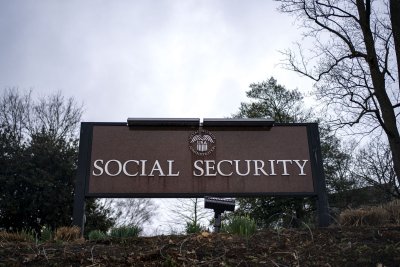Moldy food, dirty towels: Critics warn of inhumane conditions at California’s largest detention center
ADELANTO, Calif. — As federal immigration agents conduct mass raids across Southern California, the Adelanto ICE Processing Center is filling so rapidly it is reigniting longtime concerns about safety conditions inside the facility.
In less than two months, the number of detainees in the sprawling complex about 85 miles northeast of Los Angeles has surged from around 300 near the end of April to more than 1,200 as of Wednesday, according to the American Civil Liberties Union of Southern California.
The largest detention center in California, Adelanto has for years been the focus of complaints from detainees, attorneys and state and federal inspectors about inadequate medical care, overly restrictive segregation and lax mental health services.
But now, critics — including some staff who work inside — warn that conditions inside have become increasingly unsafe and unsanitary. The facility, they say, is woefully unprepared to handle a massive increase in the number of detainees.
-
Share via
“It’s dangerous,” a longtime Adelanto detention center staff member told The Times, speaking on condition of anonymity because they did not want to lose their job. “We have no staffing for this and not enough experienced staff. They’re just cutting way too many corners, and it affects the safety of everybody in there.”
On Tuesday, U.S. Rep Judy Chu (D-Monterey Park), toured Adelanto with four other Democratic members of Congress from California amid growing concern over the rapidly increasing number of detainees and deteriorating conditions inside the facility.
The facility’s manager “has to clearly improve its treatment of these detainees,” Chu said at a news conference after inspecting the facility for nearly two hours.
Some detainees told lawmakers they were held inside Adelanto for 10 days without a change of clothes, underwear or towels, Chu said. Others said they had been denied access to a telephone to speak to loved ones and lawyers, even after repeatedly filling out forms.
“I was just really shocked to hear that they couldn’t get a change of underwear, they couldn’t get socks for 10 days,” Chu told The Times. “They can’t get the PIN number for a telephone call. What about their legal rights? What about the ability to be in contact with their families? That is inhumane.”
Immigration Customs and Enforcement and GEO Group, the Florida-based private prison corporation that manages the Adelanto detention center, did not answer The Times’ questions about staffing or conditions inside the facility. The Times also sent questions to Homeland Security assistant secretary for public affairs Tricia McLaughlin, but they were not answered.
Lucero Garcia, third from left, gave an emotional account about her uncle who was taken from his work at an Orange County car wash. She and others were outside the Adelanto ICE Processing Center on Tuesday.
(Myung J. Chun/Los Angeles Times)
Over the last two weeks, new detainees have been forced to sleep on the floors of common areas without blankets and pillows and have spent days in the facility before they were provided with clean clothes and underwear, according to interviews with current detention center staff, immigration attorneys, and members of Congress who toured the facility. Some detainees have complained about lack of access to medication, lack of access to drinking water for four hours, and being served dinner as late as 10 p.m.
One detainee was not allowed his high blood pressure pills when family tried to bring it in, said Jennifer Norris, a staff attorney at Immigrant Defenders Law Center. In some cases, she said, lax medical care has led to emergencies: a Vietnamese man passed out last week because staff didn’t provide him with his necessary medication.
“It’s clear that with the ramp up enforcement, Adelanto just does not have the staff to keep pace with the aggressive enforcement that’s happening now,” Norris said. “It is bizarre. We spend millions of dollars on ICE detention and they’re not even able to provide basic necessities for the new arrivals.”
Long before Trump administration officials announced in May they were setting a new national goal of arresting 3,000 unauthorized immigrants a day, Adelanto workers worried about understaffing and unsafe conditions as the center processed new detainees.
At the end of last year, the facility held only three people. As of Wednesday, the number had swelled to 1,218, according to the ACLU of Southern California.
The climb is only partly due to the ICE agents’ recent escalation of immigrant raids.
The 1,940-bed Adelanto facility has been operating at a dramatically reduced capacity since 2020 when civil rights groups filed a class-action lawsuit demanding a drastic reduction in the number of people detained at Adelanto on the basis that they faced severe risk of contracting COVID-19. A federal judge forced the detention center to release detainees and prohibit new intakes and transfers.
But a series of federal court orders this year — the most recent in early June — has allowed the facility to fully reopen just as federal immigration agents fan out into neighborhoods and workplaces.
“As soon as the judge lifted the order, they just started slamming people in there,” an Adelanto staffer told The Times.
Eva Bitrán, director of immigrant rights at the ACLU of Southern California, said “almost everybody” held in the Adelanto facility had no criminal record before they arrived in the detention center.
“But even if they had a criminal record, even if they had served their time in criminal custody and then been brought to the ICE facility, nobody deserves 10 days in the same underwear,” Bitrán said. “Nobody deserves dirty showers, nobody deserves moldy food.”
The Adelanto ICE Processing Center.
(Myung J. Chun/Los Angeles Times)
Mario Romero, an Indigenous worker from Mexico who was detained June 6 at the Ambiance Apparel warehouse in downtown L.A., was one of dozens who ended up in Adelanto.
His daughter, Yurien Contreras, said she and her family were traumatized after her father was “chained by the hands, feet and waist,” taken to the Metropolitan Detention Center downtown and then “held hostage” in a van from 11 p.m. to 7 a.m. with no access to water, food or a restroom.
“Little did we know,” she said, “it was only the beginning of the inhumane treatment our families would endure.”
At Adelanto, she said, officials try to force her father to sign documents without due process or legal representation. The medical care was “less than minimal,” she said, the food was unsustainable and the water tasted like Clorox.
Yurien Contreras’ father was taken by ICE agents from his workplace at Ambiance Apparel in Los Angeles.
(Myung J. Chun/Los Angeles Times)
Lucero Garcia told The Times she was concerned about her 61-year-old uncle, Candido, who was detained June 9 as he worked at his job at Magnolia Car Wash in Fountain Valley.
But when she visited him Saturday, “he didn’t want to share much,” she said. “He’s worried more about us.”
This is not the first time the Adelanto detention center has faced scrutiny.
In 2018, federal inspectors issued a report finding “serious violations” at the facility, including overly restrictive detainee segregation and guards failing to stop detainees from hanging braided bed sheet “nooses.”
Five years later, current and former Adelanto detainees filed a class-action lawsuit against GEO Group, alleging the company “systematically poisoned” inmates by improperly using toxic chemicals to clean the detention center. GEO Group has denied the claims in the class-action suit.
In April, the California Department of Justice released a report that found all of the state’s six privately operated immigration detention facilities, including Adelanto, fell short in providing mental health care for detainees, medical record keeping, suicide prevention strategies, and use of force against detainees with mental health conditions.
But two staffers who spoke to The Times said they had never experienced such unsafe conditions at Adelanto.
As the prison population has increased over the last few months, they said, staff are working long hours without breaks, some even falling asleep driving home after their shifts and having car accidents. Shift duty officers with no security experience were being asked to make decisions in the middle of the night about whether to put detainees who felt threatened in protective custody. Officers, including people from food service, were being sent to the hospital to check on detainees with tuberculosis and hepatitis.
“Everyone’s just overwhelmed,” a staffer said.
Officers working over their allotted schedules were often tired when they were on duty, another staffer said.
In May, a detainee went into anaphylactic shock and ended up intubated in the hospital, the staffer said, because an officer wasn’t paying attention or was new and gave the detainee, who’s allergic to seafood, a tray that contained tuna.
At a May meeting, the warden told all executive staff that they needed to come to work dressed down on Tuesdays and Thursdays, the staffer said, because they would have to start doing janitorial work.
On June 2, a detainee at the Annex facility made his way from a medical holding area, through four locked doors, all the way back to his dorm unescorted, the staffer said — a major security breach.
“If he would’ve wanted to escape he would’ve been gone,” the staffer said. “All he did is push the buttons to access the doors and they were open for him, no questions. Apparently, whoever was in central control was too tired to check or too inexperienced.”
The detention center was becoming unsanitary, the staffer said, with trash bins not promptly emptied, bathrooms not cleaned and floors not mopped as they should be.
As new waves of detainees flooded into the facility over the last two weeks, the staffer said, the facility was chaotic and lacking basic supplies.
“We didn’t have enough to provide right away,” they said, “so we’re scrambling to get clothes and mattresses.”
Mark Ferretiz, who worked as a cook supervisor at Adelanto for 14 years until April, said former colleagues told him officers were working 16- to 20-hour shifts multiple days in a row without breaks, officers were slow to respond to physical fights between detainees, and food was limited for detainees.
“They had five years to prepare,” Ferretiz, who had served as a union steward, said of his former supervisors. “I don’t know the reason why they weren’t prepared.”
While the supply shortages appeared to ease some in recent days — a shipment of clothes and mattresses had arrived by Tuesday, when members of Congress toured — the detention center was still understaffed, the current staffer said.
Detainees were being served food on paper clam-shell to-go boxes, rather than regular trays, a staffer said, because the facility lacked employees to wash up at the end of mealtimes.
“Trash pickup’s not coming fast enough, ” a staffer said, noting that piles of trash sat outside, bagged up, beside the dumpsters.
In a statement last week, GEO Group Executive Chairman George C. Zoley said fully opening the Adelanto facility would allow his company to generate about $31 million in additional annualized revenues.
“We are proud of our approximately 350 employees at the Adelanto Center, whose dedication and professionalism have allowed GEO to establish a long-standing record of providing high-quality support services on behalf of ICE in the state of California,” Zoley said.
But after touring the facility, members of Congress said officials did not provide answers to basic questions.
When Chu asked officials about whether California immigrants were being taken to other states, she said, they said, “We don’t know.”














